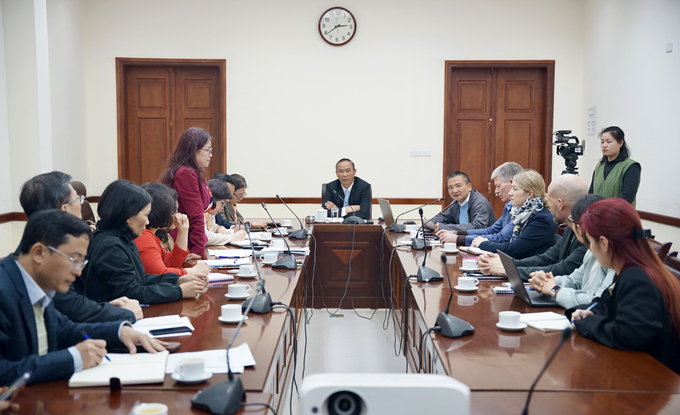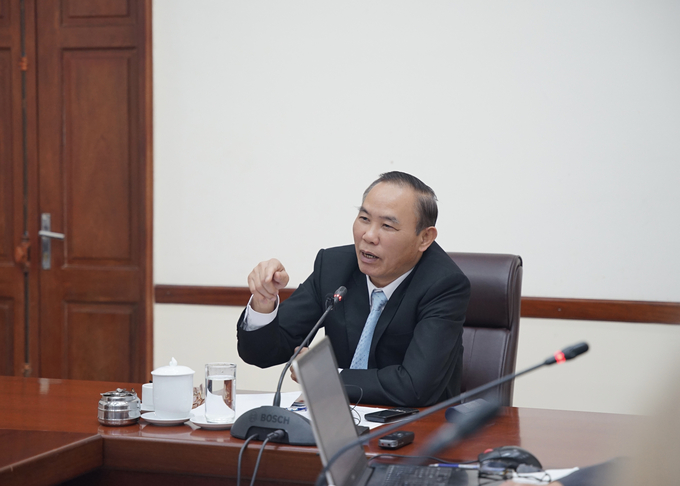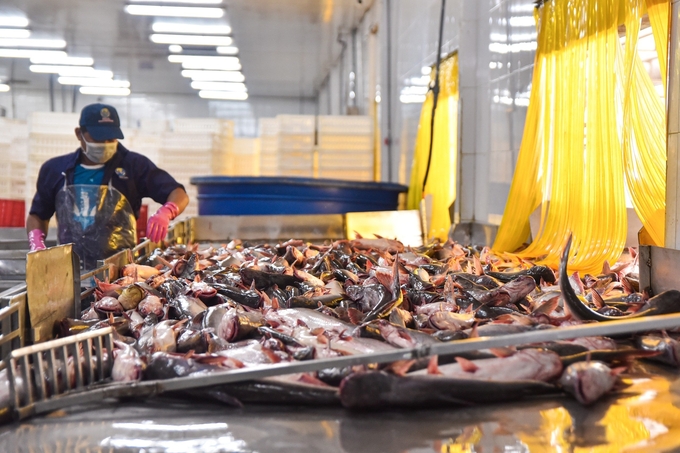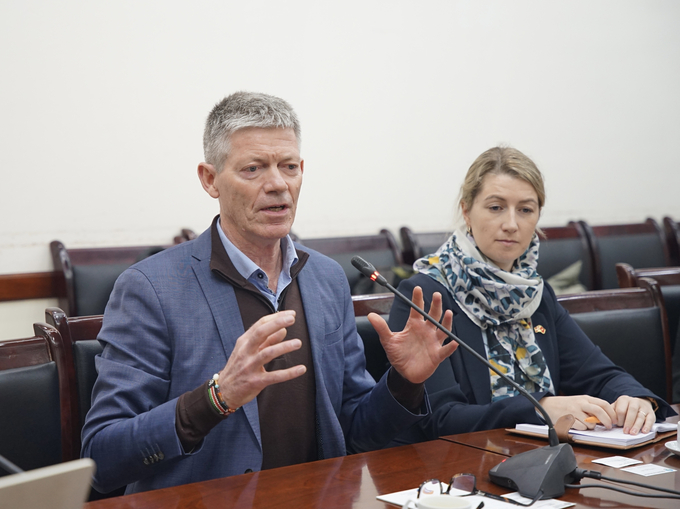November 27, 2025 | 22:10 GMT +7
November 27, 2025 | 22:10 GMT +7
Hotline: 0913.378.918
November 27, 2025 | 22:10 GMT +7
Hotline: 0913.378.918

On February 26, Deputy Minister of MARD Phung Duc Tien met with a delegation from the International Centre for Antimicrobial Resistance Solutions (ICARS).
In a report on the research activities "Reducing the use of antibiotics in catfish and tilapia farming in Vietnam" sponsored by ICARS, Associate Professor Dr. Dang Thi Lua, Director of the Research Institute for Aquaculture I, stated that it has actively collaborated with Can Tho University and relevant parties to implement the project documents and reach some agreements.
As a result, the project is being carried out under a research cooperation contract with four major components, the first of which is to conduct a comprehensive survey to understand the current state of catfish and tilapia farming in terms of farming techniques, diseases, antibiotic use, antibiotic resistance issues, and some antibiotic-reduction measures used by farmers. Based on the findings of the first component, two components are developed: reducing antibiotic use in catfish farming, investigating vaccine use, and implementing the In Pond Raceway System (IPRS) for tilapia farming. Component 4 involves researching and proposing strategies and institutions to assist farmers in reducing antibiotic use. ICARS has supported the RIA I a research cooperation contract of USD 631,050 for the years 2024-2026.

The Deputy Minister shared that for starters, antibiotic use is a major concern, but antibiotic residues present a barrier in terms of export and consumption.
Deputy Minister Phung Duc Tien stated that the Ministry of Agriculture and Rural Development recognizes this as an important financial resource and has issued a directive instructing RIA I to coordinate with institutes, universities, and relevant Vietnamese partners to implement research cooperation contracts on reducing antibiotic use in catfish and tilapia farming, with catfish being a key species in Vietnam's seafood export turnover.
The Ministry also needs the Institute to be the agency in charge of administering and implementing operations, budget allocation, tax payment, and settlement in compliance with the ICARS sponsor's requirements and Vietnamese regulations. At the same time, the Institute must report the research contract's implementation results to state management agencies under the MARD on a yearly and completion basis. The Ministry also mandates the International Cooperation Department and the Department of Animal Health to be the state management units in charge of managing and coordinating with the Institute during the research contract's implementation, as well as communicating with ICARS about any concerns that may arise.

Vietnam has 6,400 hectares of catfish farming, with a production output of approximately 1.62 million tons. Photo: Quynh Chi.
Vietnam has 6,400 hectares of catfish farming, with a production output of approximately 1.62 million tons. After nearly 25 years, the catfish business has emerged as the dominant aquaculture industry in the Mekong Delta region. To ensure the success of this investment project, Deputy Minister Phung Duc Tien offered several factors to consider.
For starters, antibiotic use is a major concern, but antibiotic residues present a barrier in terms of export and consumption. This issue is handled by Vietnam's Department of Quality, Processing, and Market Development. To fully analyze the issue, investigations are required, and this will be a critical data source.
Second, the Ministry has an aquaculture program that targets catfish. When developing policies, it is critical to combine them with policy communication. To produce catfish, it's important to consider fingerlings, feed, farming facilities, feed safety, biosecurity, disease safety, and antibiotic residues.We need to have a coordinated approach to catfish. As a result, the USD 631,050 investment is an important step toward the sector's long-term development," said the Deputy Minister.
Professor Anders Dalsgaard, Senior Scientific Advisor at ICARS, introduced ICARS as one of the first institutions to promote the growth of Vietnamese aquaculture. He echoed the Deputy Minister's emphasis on limiting antibiotic and chemical usage in aquaculture as a key component of sustainable aquaculture growth. This is particularly important for ensuring widespread acceptability and export of aquaculture products to high-demand countries.

Professor Anders Dalsgaard, Senior Scientific Advisor at ICARS, introduced ICARS as one of the first institutions to promote the growth of Vietnamese aquaculture.
"If we follow this trend, not only aquaculture products, but also cattle and crops, will demand attention to minimize antibiotic and chemical use in order to meet both export and domestic consumption criteria. This is a multi-party issue, and linking these stakeholders, which include businesses, individuals, and regulatory authorities, is critical. "We have made some progress," Dalsgaard stated.
Deputy Minister Phung Duc Tien underlined that while the pond-in-river system (IPRS) has gained popularity in Vietnam and vaccinations are employed by many large enterprises, the immunological response to vaccines remains limited. The Deputy Minister noted that the issue must be addressed through immunological solutions and vaccine use to improve efficacy.
MARD greatly appreciates ICARS' collaboration and support for the technical support project "Reducing the use of Colistin in pig farming in Vietnam".
Denmark has recently despatched high-level experts with vast experience to carry out operations as part of the effort to limit the use of Colistin in pig farming in Vietnam. However, due to objective influences such as the severe Covid-19 epidemic occurring in the years 2021-2022 and the new legislation on financial management systems in Vietnam changing in 2023, project works were terminated.
On this occasion, the Deputy Minister requested that ICARS continue to work with the Department of Animal Health and other relevant authorities to investigate opportunities for research collaboration on reducing antibiotic usage and antimicrobial resistance in pig and poultry farming in Vietnam in the future.
Translated by Dieu Linh

(VAN) On November 27, in the meeting with Minister Tran Duc Thang, Mayor Yin Yong shared Beijing’s experience to improve environment and air quality.

(VAN) After 30 years, both sides identified strategic areas of cooperation: sustainable production, increasing coffee value and training for farmers.
/2025/11/27/4910-4-164708_294.jpg)
(VAN) On the afternoon of November 27 in Beijing, Minister of Agriculture and Environment Tran Duc Thang held a working session with several major Chinese enterprises operating in the agriculture and environment sector.

(VAN) The Department of Animal Health issued a provisional guideline requesting local authorities to increase surveillance, collect samples for testing, and conduct epidemiological investigations according to the established procedure.

(VAN) The United Nations recommends that Vietnam utilize data and artificial intelligence to enhance early disaster warnings and reduce GDP losses by 3.2% in the context of climate change.

(VAN) On the morning of November 27 in Beijing, Minister Tran Duc Thang and the Deputy Commissioner General of the General Administration of Customs of China signed a protocol on fresh jackfruit exports.

(VAN) As floodwaters recede, a vast network of irrigation works across eastern Gia Lai is emerging in a state of severe disrepair, with extensive damage demanding urgent restoration ahead of the 2025-2026 winter-spring cropping season.